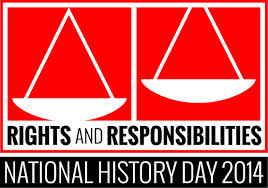Judging History Day: Making history fun and relevant!
16 May 2014 – Adina Langer
methods, public engagement, interpretation, education, consultants, training, National History Day, volunteerism
What do exhibits about Marie Antoinette’s fashion and Ayatollah Khomeini’s political action, and websites about the invention of the toilet and the dissemination of the Pentagon Papers have in common? They are all student entries in the National History Day competition that I’ve had the opportunity to review as a judge over the past seven years. Within the context of the recent lively conversations about “history relevance,” I argue that judging at History Day offers public historians a unique opportunity to teach students about the power of historical thinking to enrich their lives and to make them more capable citizens of an increasingly complex world.
For a museum professional turned historical consultant, there is nothing more fun than seeing young people excited about history, even if that excitement is, in some cases, spurred only by the prospect of winning a contest. History Day involves more than 700,000 students annually in a rigorous year-long process of “doing history.” History Day turns ordinary students into historians–public historians–in that they must convey their historical reasoning to a larger audience that includes not only their teachers but their peers, parents, posterity (many History Day submissions are archived on the NHD website), and of course, a team of judges. When students consider a larger audience for their work, they are encouraged to communicate clearly and broadly, to argue, and to entertain. These are skills that will serve them well no matter their future profession. As a volunteer judge, I have witnessed students from 3rd through 9th grade overcome shyness and demonstrate passion for topics they’ve chosen themselves. What could be more empowering?
The volunteer judges are an integral part of the process of helping the students become public historians. Judges are retired teachers, museum curators, archivists, librarians, and, in some cases, simply adults with a strong interest in history. National History Day doesn’t discriminate, and, for the most part, self-selection does a good job of weeding out judges lacking in sufficient enthusiasm to spend a Saturday each year scrutinizing student work and interviewing young people. Below, I offer suggestions on how NHD judges can maximize their positive impact on students. When judges properly mentor students, they make full use of NHD as an opportunity to make history relevant to students as a training ground for critical thinking that will help the students throughout their academic lives and beyond.
Good judging begins with an awareness of some of the common pitfalls encountered by history enthusiasts. History, like any story-based specialty, lends itself to the collection of facts around a particular event or phenomenon. When judges are “history buffs,” though, they sometimes dominate conversations with the students, asking the students questions about pet details or simply raising tangential threads of narrative and fact, separate from the students’ central arguments. Such judges award the creation of chronicles as opposed to careful analysis. Judges instead can be guides to direct students toward history and away from present-minded advocacy in their work, especially when students select topics that turn on current hot-button issues. As public historians, we encourage our students to be serious and socially aware, but critical thinking needs to be the scaffolding on which social awareness is constructed. Students interested in current events should be encouraged to find historical parallels and antecedents and to look at how people and ideas moved through time, leading, not at all inevitably, toward the current state of affairs.
This leads me back to the question of “history relevance,” which remains a watchword at the National Council for Public History (NCPH) and at her sister organization, the American Historical Association (AHA), among others. History Day is one program widely embraced as a natural advocate for history at the local, state, and national level. National History Day judges have an opportunity to mentor students to think historically, even if their academic paths don’t lead to history degrees. Historical thinking serves all of our citizens well as they strive to navigate a world increasingly fraught with polemic backed by sketchy evidence. Debates about immigration, economic crises, and climate change, for example, often lack public discussion of historical precedents for proposed actions and inactions. Yet, I could imagine History Day projects that would elucidate how people struggled with these issues in the past, balancing cultural and economic priorities unique to their time yet still resonant with students today. As public historians, we understand that the present is contingent upon specific events in the past, and not all interpretations of historical events are equally valid. History Day is one arena in which we can help students to internalize this understanding early in their academic lives, and we can help them to have fun in the process!
~ Adina Langer is a public history consultant and principal at Artiflection, LLC.





2 comments